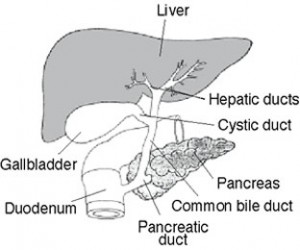
Rep. John Murtha (D-PA) died yesterday, a week after routine gall bladder surgery (cholecystectomy). He was a powerful congressman with his finger on the button of Pentagon appropriations.
And with his high-profile death comes an opportunity to explore some medical malpractice issues.
So let’s do this in Q & A form:
What is the first reaction as to why this happened?
First up is the most common reason for malpractice litigation with gall bladder surgery: That the common bile duct was mistakenly cut. I don’t know what happened here, of course, since I don’t have the medical records or the autopsy results, but you can bet that is one of the first places people will look.
 As basic background, the liver produces bile that helps us digest. It is transmitted to the intestines via ducts. The gallbladder stores bile. A schematic is seen here at left.
As basic background, the liver produces bile that helps us digest. It is transmitted to the intestines via ducts. The gallbladder stores bile. A schematic is seen here at left.
Was this due to infection, instead of a common bile duct injury?
Some are claiming that the death occurred because the intestine was mistakenly cut during surgery, and that this caused an infection. Someone investigating the case would then naturally ask the following questions:
Was the cut intestine noticed during surgery, and if not, why not? Cutting something that you’re not supposed to cut is one thing. But failing to notice that it was cut is a whole different thing. This is often the dividing line between when a malpractice case is successful or not. Bad results by themselves don’t mean malpractice. Failing to recognize mistakes, however, is a different concept entirely.
If noticed during surgery, what was the response? This surgery was done via a laparoscope, in which the scope is passed through a small incision, with surgery done with a camera-assist. Depending on when and where the bad surgical cut happened, and whether it was noticed at the time, the logical questions are who, if anyone, was called in to assist in the repair and how was it done?
When were the first signs and symptoms of infection noticed and reported and what was done about it? If the cut was noticed during surgery, then in addition to any potential antibiotics that may have been given, would have been very strict discharge instructions to the patient on the signs and symptoms of infection and the critical nature of prompt action.
If this is a known risk of the procedure, why blame the doctor?
This one is a classic, and defendants love it in the courtroom. But it is the wrong question to ask. The issue is not whether something was a known complication or risk, but whether it was avoidable with good care.
Think of it this way: Is a car accident a risk of driving? Does the fact that accidents are a risk of driving mean that the guy who ran the stop sign is not responsible?
Was Murtha just one of up to 98,000 estimated deaths from malpractice in the US each year (Study: To Err is Human)? Time will tell on that one. And we will see to what extent if death has an effect on the health care debate in Congress and the desire by some to grant certain immunities to the medical industry for malpractice.
On a last note, not only was Murtha deeply involved in political-military issues, but the surgery took place at the National Naval Hospital in Bethesda, MD. This adds another potential political element to any investigation or legal action in the event that family moves in that direction.